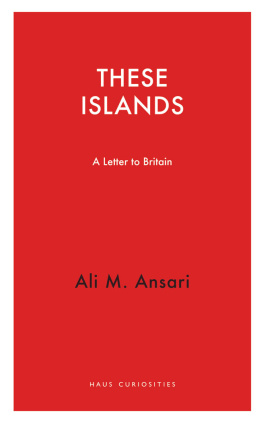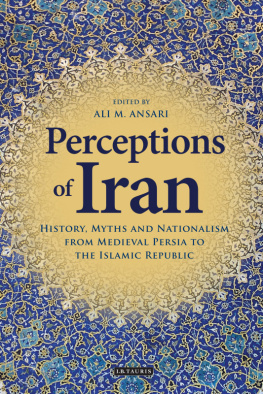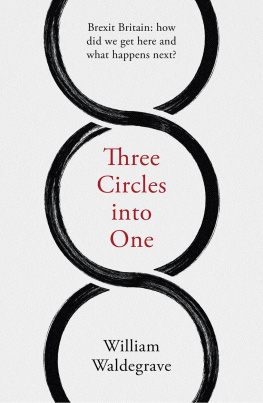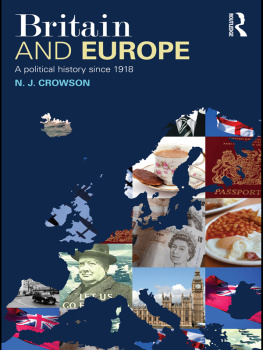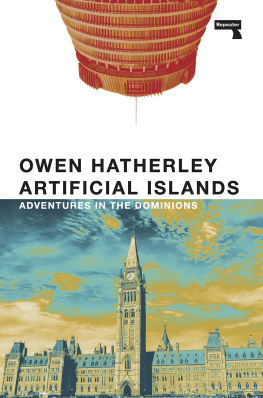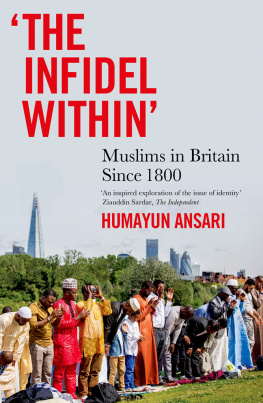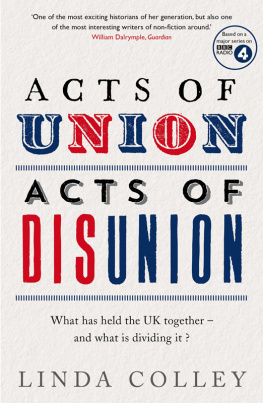Contents
Pagebreaks of the print version
HAUS CURIOSITIES
These Islands
About the Author
Ali M. Ansari is a Professor of Modern History with reference to Iran at St. Andrews University in Scotland, where he is also the founding director of the Institute of Iranian Studies. He is a Fellow of the Royal Society of Edinburgh and a Senior Associate Fellow at the Royal United Services Institute. Ansari is the author of Iran: A Very Short Introduction and Iran, Islam and Democracy .
Ali M. Ansari
THESE ISLANDS
A letter to Britain

First published by Haus Publishing in 2018
4 Cinnamon Row
London SW 11 3 TW
www.hauspublishing.com
Copyright Ali M. Ansari, 2018
The right of the author to be identified as the author
of this work has been asserted in accordance with
the Copyright, Designs and Patents Act 1988
A CIP catalogue record for this book is
available from the British Library
Print ISBN: 978-1-910376-98-0
Ebook ISBN: 978-1-912208-14-2
Typeset in Garamond by MacGuru Ltd
Printed in Spain
All rights reserved
But in any calculation about it one has got to take into account its emotional unity, the tendency of nearly all the inhabitants to feel alike and act together in moments of supreme crisis.
George Orwell, The Lion and the Unicorn
Acknowledgements
This Haus Curiosity has been longer in gestation than I would care to admit, drawn as it has been from my research, teaching and personal experiences over the past decade. In line with the series it aims to provide a contribution to the wider debate, and I hope readers will read it in the spirit in which it is intended. I am especially grateful to the many and varied readers who have taken the time to read through the draft and thought processes as they took shape most obviously Peter Hennessy for having invited me to contribute to his series in the first place and for his helpful comments on the draft. In addition, Kevin Hague, Sam Taylor, Tom Holland, James Holland, Melanie Gibson, David Morgan, Chandrika Kaul and Charles Tripp were all kind enough to offer suggestions, corrections and clarifications, which I have sought to incorporate. My publishers, Barbara Schwepcke and Harry Hall, have been a huge encouragement, and my editor, Jo Stimpson, has been truly virtuous in her patience. Last and by no means least, I am grateful to my wife Marjon, whose ingenuity in challenging every premise of the piece has encouraged me to think, rethink and think again.
This is an interpretive essay on narratives and historical writing and presentation in both the academic and popular senses. It starts with an outline of Whig history the thesis before turning to its critics antithesis and concludes with an assessment synthesis. This approach by necessity will involve a degree of overlap as ideas and narratives are revisited, and arguments made. I hope nonetheless that any repetition serves to strengthen the overall argument and has been successfully kept to a minimum. It goes without saying that any errors are mine and mine alone.
Introduction
Why me?
A native of Iran and an historian of that country, I settled in the United Kingdom at the age of ten, from which time I developed an acute, if personal, appreciation of Britain. Born in Rome, educated in London, living and working in the Kingdom of Fife, I have long been comfortable with a multilayered identity that complements and informs. I self-identify as British-Iranian. This essay represents my first attempt to address the question(s) of the country of my adoption, and my view is of one who stands at the crossroads of cultures. I take encouragement, in this otherwise daunting task, from the fact that being on the borderlands has not precluded others from presenting their assessments of their adopted countries, nor indeed prevented many excellent histories of Iran from being written by Britons. To paraphrase Kipling, what should they know of Britain who only Britain know?
Why do I write ?
A few years back, in the run-up to the referendum on Scottish independence, I went to dinner at the house of some close friends. Inevitably the issue of the referendum was raised along with broader questions about the value or otherwise of the British state. All of us agreed that Britain had problems, but I stressed that I still considered my greatest most treasured possession to be my British passport. It is still unclear to me who was more surprised: my colleagues, who reacted to my statement with a mixture of puzzlement and surprise, or myself, being nonplussed by my colleagues reaction. I quickly explained that the passport signified security and stability a refuge , if you will, from an otherwise turbulent world and that this in itself was an invaluable asset.
There was a time when British exceptionalism in this particular respect was widely acknowledged. Long before people got used to berating the British Empire, many applauded British stability, the ability of the people of these islands to govern and indeed regulate themselves with such skill and efficiency and the fact that they had established what appeared to be an organic political harmony that was the envy of their revolutionary neighbours. It may have been less interesting even a tad boring but who needed interesting when the consequences of revolution were so disruptive? So comfortable and confident had Britain become in its political skin that it in fact became a refuge for both those escaping persecution and turmoil and, with no hint of irony, to revolutionaries from other countries the most famous perhaps being Karl Marx.
The truth is that Britain has long been a refuge, even a sanctuary, for those fleeing persecution. Immigrants, and political refugees in particular, have long been part of the fabric of the British state and, one might add, the British sense of itself as the quintessentially liberal state, both in its political definition and in terms of generosity of spirit. George Orwell considered the civilisation that characterised these islands as gentle a term that is ambiguous enough to Indeed, it is a fact that those who seek to define a community often come from its margins. It is at the political borders, the wider hinterland the point of highest tension, if you will that clarity can most easily be achieved, and is most enthusiastically pursued.
Whats in a name?
To any visitor to these islands, one of the curiosities that will soon become apparent is the great difficulty in finding a collective noun that satisfies everyone or indeed works as a suitable descriptor. Orwell noted that there were six terms that were used, often interchangeably: England, Britain, Great Britain, the British Isles, the United Kingdom and in very exalted moments, Albion.
It should come as little surprise that those on the margins were enthusiastic about the adoption of a more inclusive term; as noted, it is at the margins that nationalism comes into focus. Even accepting the invented nature of identities, and their political expression in nations, there is no doubting the difficulty in reconciling the various terms to the satisfaction of all. It reflects in many ways the multi-layered and organic construction of the modern state; the process is one of a series of compromises being harmonised with greater or lesser success over time. But this harmonisation has proved by no means perfect, and the continued difficulty and lack of rationality has led some to conclude that the entire edifice is illegitimate. Much depends, of course, on how we define our terms.

